

UK Centre for Materials Education. By Cris Arnold Background and Context Issues of environmental protection and sustainable development are gaining an increasing importance in everyday life, and nowhere is this more so than in the field of Materials Science and Engineering.
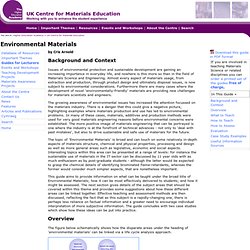
Almost every aspect of materials usage, from extraction and production, through product design and ultimately disposal issues, is now subject to environmental considerations. Furthermore there are many cases where the development of novel 'environmentally-friendly' materials are providing new challenges for materials scientists and engineers. The growing awareness of environmental issues has increased the attention focussed on the materials industry. Life Cycle Assessment. Green Chemistry Initiative - Resources. Resources Whether you're a graduate student or faculty member looking to reduce waste in your own research, or just someone interested in learning more about green chemistry, the GCI has outlined some helpful tools and resources below for all interested individuals.
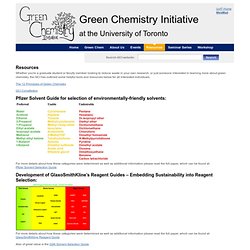
The 12 Principles of Green Chemistry GCI Constitution Pfizer Solvent Guide for selection of environmentally-friendly solvents: For more details about how these categories were determined as well as additional information please read the full paper, which can be found at: Pfizer Solvent Selection Guide. Veröffentlichungen. Green Chemistry Education - ACS Symposium Series.
Structure and Physical Properties of Zein/Pluronic F127 Composite Films - Journal of Agricultural and Food Chemistry. Department of Food Science, Rutgers University, 65 Dudley Road, New Brunswick, New Jersey 08901-8520, United States J.
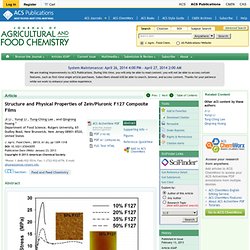
Agric. Food Chem., 2013, 61 (6), pp 1309–1318 DOI: 10.1021/jf3043055 Publication Date (Web): January 23, 2013 Copyright © 2013 American Chemical Society. Welcome to ECOTOX. Life Cycle Assessment and Environmental Product Declarations Educational Webinars. citeseerx.ist.psu.edu/viewdoc/download?doi=10.1.1.19.4855&rep=rep1&type=pdf. Applications of life cycle assessment to NatureWorks™ polylactide (PLA) production. Abstract NatureWorks™ polylactide (PLA)1 is a versatile polymer produced by Cargill Dow LLC.
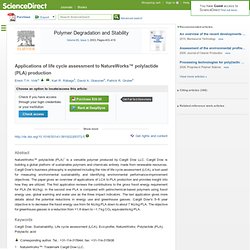
Cargill Dow is building a global platform of sustainable polymers and chemicals entirely made from renewable resources. Cargill Dow's business philosophy is explained including the role of life cycle assessment (LCA), a tool used for measuring environmental sustainability and identifying environmental performance-improvement objectives. The paper gives an overview of applications of LCA to PLA production and provides insight into how they are utilized. The first application reviews the contributions to the gross fossil energy requirement for PLA (54 MJ/kg). Life Cycle Assessment.
The International Organization for Standardization (ISO) defines life cycle assessment (LCA) as the following: "Compilation and evaluation of the inputs, outputs and the potential environmental impacts of a product system throughout its life cycle" (ISO 14040: 1997)[1].
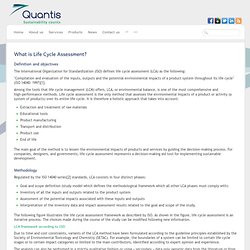
Among the tools that life cycle management (LCM) offers, LCA, or environmental balance, is one of the most comprehensive and high-performance methods. Resource-efficiency > Consumption > Standards and Labels > Measuring Sustainability > Life Cycle Assessment. Life Cycle Assessment. Life_Cycle_Assessment_Overview.jpg 1.630×6.520 Pixel. Life-cycle assessment. Life-cycle assessment (LCA, also known as life-cycle analysis, ecobalance, and cradle-to-grave analysis)[1] is a technique to assess environmental impacts associated with all the stages of a product's life from-cradle-to-grave (i.e., from raw material extraction through materials processing, manufacture, distribution, use, repair and maintenance, and disposal or recycling).
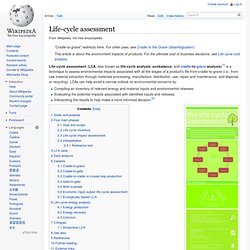
Veröffentlichungen. Eco-Efficiency Label. How Green Is That Product? An Introduction to Life Cycle Environmental Assessment. About the Course Paper or plastic?
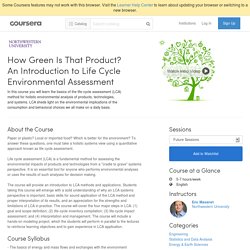
Local or imported food? Which is better for the environment? ENVR E-151 (13749) Home § Life Cycle and Supply Chain Sustainability Assessment (Fall 2013) Life Cycle Assessment Fundamentals. Introduction to Sustainability. About the Course This course introduces the academic approach of Sustainability and explores how today’s human societies can endure in the face of global change, ecosystem degradation and resource limitations.
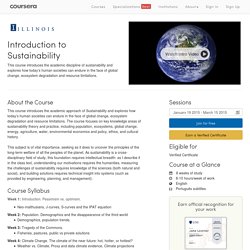
The course focuses on key knowledge areas of sustainability theory and practice, including population, ecosystems, global change, energy, agriculture, water, environmental economics and policy, ethics, and cultural history. This subject is of vital importance, seeking as it does to uncover the principles of the long-term welfare of all the peoples of the planet. FREE LCA Online Course Offered by Harvard School of Public Health. Thermodynamics and the Destruction of Resources - Cambridge Books Online. Reference Title: References Reference Type: reference-list J.
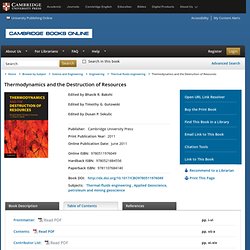
Diamond, Collapse – How Societies Choose to Fail or Survive (Viking Penguin, New York, 2005). G. C. S. R. Life Cycle Assessment. Glocalized Solutions for Sustainability in Manufacturing: Proceedings of the ... - Jürgen Hesselbach, Christoph Herrmann. Eco-LCA: Ecologically Based Life Cycle Assessment. web.mit.edu/newsoffice/2009/techtalk53-19.pdf. Manufacturing inefficiency. Modern manufacturing methods are spectacularly inefficient in their use of energy and materials, according to a detailed MIT analysis of the energy use of 20 major manufacturing processes.
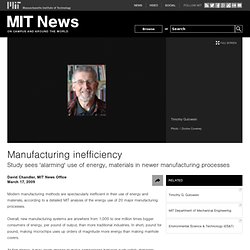
Overall, new manufacturing systems are anywhere from 1,000 to one million times bigger consumers of energy, per pound of output, than more traditional industries. In short, pound for pound, making microchips uses up orders of magnitude more energy than making manhole covers. At first glance, it may seem strange to make comparisons between such widely disparate processes as metal casting and chip making.
But Professor Timothy Gutowski of MIT's Department of Mechanical Engineering, who led the analysis, explains that such a broad comparison of energy efficiency is an essential first step toward optimizing these newer manufacturing methods as they gear up for ever-larger production. Solar panels are a good example. The bottom line is that "new processes are huge users of materials and energy," he says. Energy, Sustainability, and Life Cycle Assessment. Course Summary | Learning Objectives | Who Should Attend | Program Outline | Schedule | Participants' Comments | About the Lecturers | Location | Links & Resources | Updates Course Summary The purpose of this class is to address the issues of sustainability and relate them to an engineering perspective.
First, we review the concept of sustainability from several points of view including economics, ecology, and business. This discussion includes such concepts as the “Triple Bottom Line,” inclusive wealth, and resilience. We then develop a resource accounting perspective in some detail with the emphasis in four areas: Life Cycle Assessment. UNEP DTIE SCP Branch. The 10YFP adopted at Rio+20 The United Nations Conference on Sustainable Development (Rio+20) adopted the 10-Year Framework of Programmes on Sustainable Consumption and Production (10YFP).
This is a concrete and operational outcome that responds to the 2002 Johannesburg Plan of Implementation (JPOI) which calls to all stakeholders to “Encourage and promote the development of a 10-year framework of programmes (10YFP) in support of regional and national initiatives to accelerate the shift towards sustainable consumption and production to promote social and economic development within the carrying capacity of ecosystems...”. Rio+20 Outcome Document "The Future we Want". The Resolution A/CONF.216/5 - A 10-year framework of programmes on sustainable consumption and production patterns is available for download in 6 languages: [Arabic] [Chinese] [English] [French] [Russian] [Spanish] More information is available at the UNCSD2012 website. Startseite. Die Abteilung Ganzheitliche Bilanzierung wurde 1989 am Institut für Kunststoffprüfung und Kunststoffkunde (IKP) an der Universität Stuttgart gegründet.
Seit 2006 ist sie am Lehrstuhl für Bauphysik (LBP) der Universität Stuttgart angesiedelt. Arbeitsschwerpunkt der Abteilung ist die Ganzheitliche Bilanzierung und Analyse von Produkten, Prozessen und Dienstleistungen unter ökologischen, ökonomischen, sozialen und technischen Gesichtspunkten zur Entscheidungsunterstützung über den gesamten Lebensweg. publica.fraunhofer.de/eprints/urn:nbn:de:0011-n-2667855.pdf. Startseite. Steeluniversity.org. Sustainability.
In these modules you will examine sustainability and the environment, drawing on examples from the automotive, construction and steel industries. You will then move onto an understanding and appreciation of the principles of life cycle thinking and life cycle assessment (LCA) enabling you to conduct some relatively simple LCAs. It is hoped that this will help you with decision-making in your work and private life. Sustainability is intrinsic to both Processing and Applications of steel. After studying what Sustainability means, the causes and consequences of environmental impacts, the recyclability of steel and the contribution steel makes to sustainable development, the principles of life cycle thinking (cradle to grave concepts) are introduced. The methodology for conducting a Life Cycle Assessment is described, with examples drawn from automotive, construction and steel industries. Roll over the links to see a description of each individual module.
Introduction to Environmental Life Cycle Assessment. In the previous sections you have learnt about Sustainability and about environmental impact categories and discovered the basic idea of Life Cycle Thinking. The products and processes you deal with at work and in your personal life affect the environment, adversely or beneficial. But how can you ensure that you are doing the best possible job in realizing the benefits of technology with minimal environmental damage? A tool that helps you with your decision making in seeking to achieve this balance is Life Cycle Assessment. In principle, a Life Cycle Assessment (LCA) provides a way of quantifying the diverse effects on the environment caused by products throughout their entire life cycle. After completing this section, you should be able to:
Rethinking recycled fiber: using facts and science to combat common myths - The Environmental Quotient. www.vereon.ch/shop/ProdukteDetails/chemie_produktion.pdf. Informationen zu Kernenergie, Atomenergie, Kernkraft, Atomkraft. Kernenergie: Klimaschutz "vom Anfang bis zum Ende"Kernkraftwerke sind Klimaschützer vom Anfang der Urangewinnung, über den Bau und Betrieb bis hin zu Entsorgung und Rückbau der Anlagen zur "Grünen Wiese". Neben Wasser und Windenergie weist Kernkraft die mit Abstand geringsten CO2-Emissionen aller Energieträger auf, wie u.a. das Paul-Scherrer-Institut (PSI), Villingen/Schweiz, ermittelt hat. Das Forschungsinstitut hat die Nachhaltigkeit verschiedener Energiesysteme untersucht und festgestellt: Mit ihrer positiven Klimabilanz liegt die Kernenergie noch vor Energieträgern wie Photovoltaik, Geothermie und Biogas.
Auch andere nationale und internationale Studien, beispielsweise vom Öko-Institut und der Europäischen Kommission, bestätigen die vergleichsweise geringe CO2-Freisetzung bei der Erzeugung von Nuklearstrom. Bezieht man den kompletten Lebenszyklus der Kernenergienutzung ein (u.a. Life Cycle Assessment (LCA) Resources. The following provides a list of publications, books, standards, and websites that contain additional information on both managing and conducting an LCA. While this list is not comprehensive, it serves as a starting point for researching LCA. If you would like to add a new LCA resource to the list, send an e-mail to Maryann Curran. Disclaimer: Links to non-EPA sites and comments provided in the descriptions do not imply any official EPA endorsement.
Furthermore, EPA does not accept any responsibility for the opinions, ideas, data, or products presented at those locations, or guarantee the validity of the information provided. EPA does not guarantee the suitability of the information for any specific purpose. Amazon. Amazon. Amazon. 06_09_2012_Transport_Schaefer. Stoffstromanalyse und Life Cycle Assesment: – IWAR - Fachgebiet Industrielle Stoffkreisläufe – Technische Universität Darmstadt. Die Verringerung des Rohstoff- und Energieverbrauchs ist eine wesentliche Voraussetzung für eine nachhaltige Entwicklung auf globaler Ebene.
Wie kann einer wachsenden Bevölkerung ein guter Lebensstandard ermöglicht werden, wie können ausreichend Nahrung und Energie erzeugt werden, wie kann der Bedarf an Konsumgütern für eine moderne Gesellschaft befriedigt werden, ohne unsere natürliche Umwelt zu übernutzen oder zu zerstören? Das Fachgebiet Stoffstrommanagement und Ressourcenwirtschaft untersucht diese Fragen für konkrete Problemstellungen. Wir nutzen systemanalytische Methoden, insbesondere Stoffstromanalysen und Life Cycle Assessment (Ökobilanzen), wir erarbeiten Szenarien und Modelle, wir entwickeln chemisch-analytische Methoden und wir arbeiten experimentell an der Entwicklung neuer Verfahren zur Nutzung von Sekundärrohstoffen.
Wir laden Sie herzlich ein, sich auf den folgenden Seiten über unsere Aktivitäten zu informieren. 04_09_2012_Referentenvortrag_Schebek. RitterLebensdauer. Life Cycle Assessment in Technology Development - The Case of Micro Process Engineering - tuprints. Modellierung von Stoffstromsystemen I Stoffstromanalyse und Life Cycle Assessment – IWAR – Technische Universität Darmstadt. Ökobilanz (LCA): ein Leitfaden für Ausbildung und Beruf - Walter Klöpffer, Birgit Grahl.